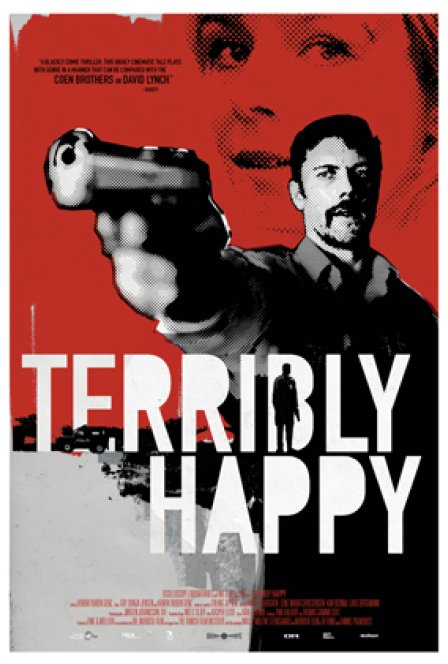Due to a complicated eurocentrism inherent in our thinking about art, it’s easy to dismiss cinema from this side of the shore as somehow lacking. They care about art in Europe, or at least take it much more seriously, right? While we shower films like Crash and Precious with more awards than they can carry out of the building, in Europe they champion and award thought-provoking, challenging work. Right?
Well, it’s a myth that’s easy to believe, but one that needs to be busted. Yes, they make crap films in Europe. Sure, maybe not at as high a volume as here (they produce less films in general), but the stink of the crap is just as strong. For every Lars von Trier, you have a Henrik Ruben Genz. His new film, Terribly Happy, is an official Danish selection for the Oscars and winner of seven Robert Awards (Danish Oscars), sweeping all major categories. Derivative of the zanier aspects of the Coen Brothers and David Lynch, the film manages to be a shallow composite of ideas and references with no thread to hold it together.
Following a transfer due to mental health problems in his hometown of Copenhagen, police officer Robert Hanson (Jakob Cedergren) arrives in a small, remote Danish ghost town to replace the mysteriously missing former chief. After discovering that his predecessor isn’t the only one missing, Ingerlise (Lene Maria Christensen), the wife of the town drunk, stumbles into his life, hurdling the narrative toward a chain of events that forces Robert to come to grips with his troubled past and the strong bonds that hold the village together. Oh yeah, there’s also a sneaking suspicion that the missing persons are all at the bottom of a murky, sludge-filled swamp on the outskirts of town. And there’s a talking cat.
Based on the above, Terribly Happy had the potential to be great, campy fun. Unfortunately, the film bogs down under all the craziness bursting out of its synopsis. Very quickly, the film spills into a mess of clichés: falling back on unimaginative, familiar noir tropes of plot and character development; weird for the sake of being weird; naively and infuriatingly self-conscious in its attempts at dark comedy. The dark part is not the problem — muddy vistas, a doctor’s office turned shooting gallery, and a local bar full of small-town grotesqueries are all accounted for. The comedy seems to have been forgotten about, or at least taken for granted. Scenes tend to play out with the assumption that some sort of comedic form will emerge out of nowhere, as if timing — and an actual joke — have nothing to do with it. And without the comedy, the rest of the mundane, conventional story falls to pieces.
Between all the moments of forced lunacy, the filmmakers manage to build a few genuinely tense sequences strictly through mise-en-scène. The climax elicits a few hair-raising moments of shock through its use of silence and terse editing, while many early scenes take advantage of the gray, wide-open spaces to provide the film’s gloomy, atmospheric backbone. An idiotic drinking competition at the local bar uses the subjective dolly and smash cuts in a way reminiscent of the early work of the Coen Brothers. While it seems out of place in context with the rest of the film, it was a breath of fresh air in the middle of a film that was in desperate need of breaking out of its shell of self-parody.
Like in Ruben Genz’s previous film, Chinaman, a story of love through language barriers that never reaches past quasi-racist jokes at the expense of its Chinese characters, Terribly Happy manages to burrow into clichés without thinking of the consequences. The film wears its influences as a badge of honor — but to an audience, it’s just smoke and mirrors.

